Uw bericht is verzonden.
We verwerken je aanvraag en nemen zo snel mogelijk contact met je op.
Het formulier is succesvol verzonden.
Meer informatie vindt u in uw mailbox.
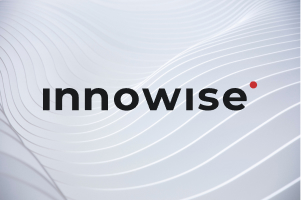
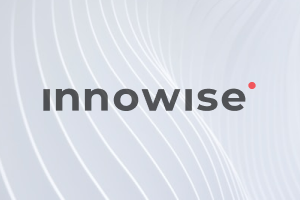
De gezondheidszorg omarmt automatisering op alle gebieden - van administratieve taken tot zorggerelateerde procedures - en RPA-technologie speelt zeker een rol in deze transformatie. Voor zorgverleners brengt automatisering van robotische processen veel voordelen met zich mee, maar de belangrijkste drijfveren voor invoering zijn economisch van aard: automatisering en analyse kunnen helpen bij het voorkomen van $200-$360 miljard van de uitgaven aan gezondheidszorg.
In dit artikel bespreken we de details: de workflows die door RPA-bots kunnen worden afgehandeld, de concrete bedrijfsresultaten die ze opleveren en manieren om de technologie toe te passen.
Laat RPA bots vervelende taken afhandelen terwijl u zich concentreert op wat het belangrijkst is - de gezondheid van patiënten.
Innowise biedt een volledig scala aan RPA diensten voor bedrijven in de gezondheidszorg, om hen te helpen complexe en foutgevoelige klinische workflows efficiënt te automatiseren. Vertrouwend op de praktische ervaring van onze senior en middle RPA ontwikkelaars, hebben we meer dan 10 enterprise-level projecten opgeleverd die operaties optimaliseren, kosten verlagen, menselijke fouten minimaliseren en snel ROI opleveren.
In de afgelopen jaren is de RPA-markt voor de gezondheidszorg gestaag gegroeid omdat steeds meer medische organisaties de praktische waarde van automatisering hebben ontdekt. In 2024 werd de markt getaxeerd op $2,22 miljard en in 2034 zal deze naar verwachting $22,56 miljard bedragen, aangedreven door de toename in de toepassing van AI, ML, data analytics en cloud technologieën.
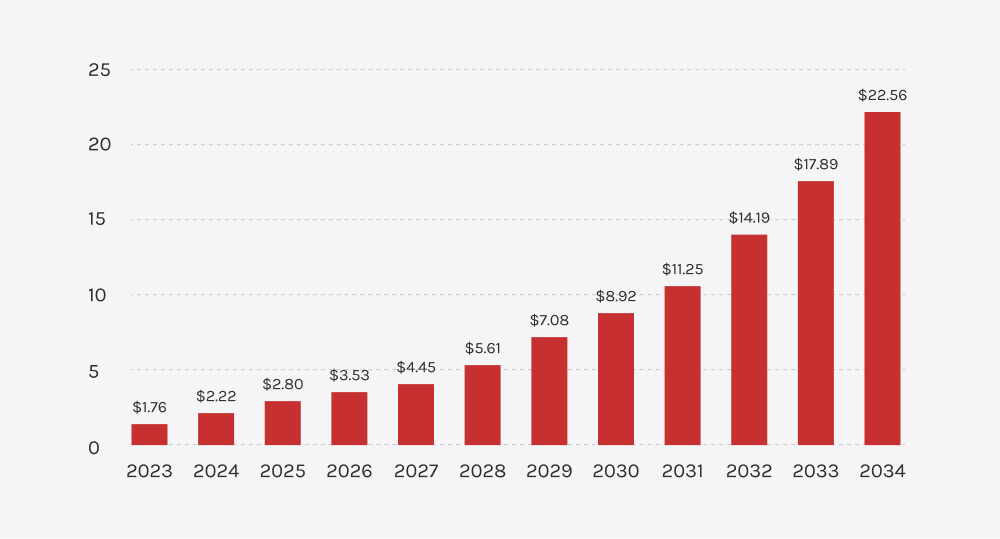
Dagelijks worstelen medische en administratieve medewerkers met repetitieve taken die hun volledige aandacht opeisen - met gegevensinvoer en verzoeken of documentverwerking bovenaan de lijst.
Met het groeiende tekort aan arbeidskrachten stapelen deze vervelende taken zich op, waardoor werknemers in de gezondheidszorg ontevredener zijn over hun baan dan ooit tevoren. Gelukkig kunnen RPA-oplossingen het script omdraaien: ze kunnen saaie routinetaken overnemen en de last voor werknemers verlichten.
Bij gebruik voor afsprakenbeheer verwerken RPA-bots de aanvraagformulieren van patiënten, stellen ze beschikbare tijdslots voor met geschikte specialisten op locaties in de buurt, boeken ze online of persoonlijke consulten en sturen ze herinneringen naar patiënten. Bots kunnen ook automatisch de agenda's van zorgverleners aanpassen op basis van annuleringen of herschikkingen.
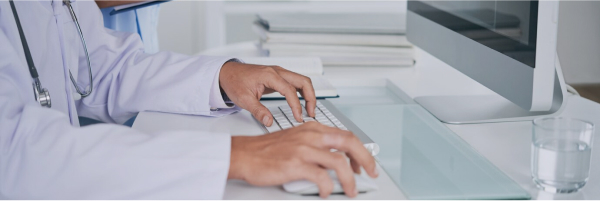
Zorgaanbieders zetten RPA in voor soepele inkomstencyclusbeheer (RCM) - Van de registratie van patiënten en het verifiëren van verzekeringen tot het afhandelen van betalingen. RPA bots leggen nauwkeurig alle diensten vast die zijn geleverd door professionals in de gezondheidszorg, sturen follow-ups over onbetaalde rekeningen, houden financiële gegevens bij en genereren rapporten over de RCM-stroom.

RPA bots halen patiëntgegevens uit medische dossiers, passen de juiste facturatiecodes toe en vullen patiëntfactuursjablonen met relevante gegevens. Door facturering en facturering met RPA te automatiseren, zorgen zorgverleners ervoor dat alle geleverde medische diensten nauwkeurig worden gefactureerd aan de juiste betalers zonder het risico van menselijke fouten.

Dankzij NLP destilleren RPA-oplossingen voor klinische documentatie waardevolle medische informatie uit verschillende bronnen, zoals patiëntonderzoeken, testresultaten, samenvattingen van afspraken, scans van klinische documenten en andere relevante gegevens. Vervolgens structureren en registreren de bots de informatie in realtime in EHR- en andere systemen.

RPA bots kunnen de compliance- of auditrapportformulieren interpreteren met behulp van NLP-technologie. Vervolgens halen bots belangrijke informatie uit financiële en klinische documenten en IT-systemen en maken ze gedetailleerde rapporten. RPA is ook efficiënt voor het uitvoeren van kruiscontroles op de nauwkeurigheid van gegevens en het opsporen van discrepanties, zodat de eindrapporten perfect zijn.

In plaats van tijd te besteden aan het invullen van recepten, kunnen zorgverleners het proces automatiseren met RPA. Bots kunnen medicatiegegevens uit het EPD halen, receptformulieren invullen en ze naar vooraf geselecteerde apotheken sturen. RPA bots kunnen ook de verzekeringsdekking voor voorgeschreven medicijnen controleren en mogelijke interacties tussen medicijnen signaleren.

Omdat claimbeheer in hoge mate gestandaardiseerd is, kunnen RPA-bots het hele proces met gemak afhandelen, van het indienen van claims tot tracking en terugbetaling. De bots vullen declaratieformulieren in, verifiëren of patiënten in aanmerking komen voor een verzekering, houden de status van declaraties bij, markeren declaratieproblemen ter controle en dienen deze in bij de verzekeraars.

RPA-oplossingen beheren inkomende en uitgaande verwijzingen van huisartsen naar gespecialiseerde zorgverleners of diagnostische procedures. De bots genereren en verzenden verwijzingsformulieren, houden de goedkeuringsstatus bij en verkorten de wachttijden voor verwijzingen aanzienlijk.
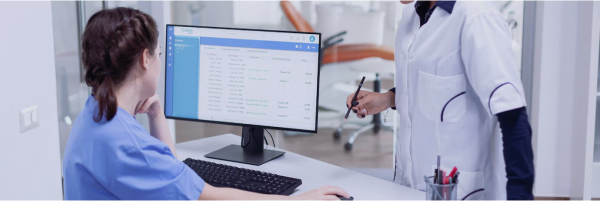
Bij gebruik voor afsprakenbeheer verwerken RPA-bots de aanvraagformulieren van patiënten, stellen ze beschikbare tijdslots voor met geschikte specialisten op locaties in de buurt, boeken ze online of persoonlijke consulten en sturen ze herinneringen naar patiënten. Bots kunnen ook automatisch de agenda's van zorgverleners aanpassen op basis van annuleringen of herschikkingen.

Zorgaanbieders zetten RPA in voor soepele inkomstencyclusbeheer (RCM) - Van de registratie van patiënten en het verifiëren van verzekeringen tot het afhandelen van betalingen. RPA bots leggen nauwkeurig alle diensten vast die zijn geleverd door professionals in de gezondheidszorg, sturen follow-ups over onbetaalde rekeningen, houden financiële gegevens bij en genereren rapporten over de RCM-stroom.

RPA bots halen patiëntgegevens uit medische dossiers, passen de juiste facturatiecodes toe en vullen patiëntfactuursjablonen met relevante gegevens. Door facturering en facturering met RPA te automatiseren, zorgen zorgverleners ervoor dat alle geleverde medische diensten nauwkeurig worden gefactureerd aan de juiste betalers zonder het risico van menselijke fouten.

Dankzij NLP destilleren RPA-oplossingen voor klinische documentatie waardevolle medische informatie uit verschillende bronnen, zoals patiëntonderzoeken, testresultaten, samenvattingen van afspraken, scans van klinische documenten en andere relevante gegevens. Vervolgens structureren en registreren de bots de informatie in realtime in EHR- en andere systemen.

RPA bots kunnen de compliance- of auditrapportformulieren interpreteren met behulp van NLP-technologie. Vervolgens halen bots belangrijke informatie uit financiële en klinische documenten en IT-systemen en maken ze gedetailleerde rapporten. RPA is ook efficiënt voor het uitvoeren van kruiscontroles op de nauwkeurigheid van gegevens en het opsporen van discrepanties, zodat de eindrapporten perfect zijn.

In plaats van tijd te besteden aan het invullen van recepten, kunnen zorgverleners het proces automatiseren met RPA. Bots kunnen medicatiegegevens uit het EPD halen, receptformulieren invullen en ze naar vooraf geselecteerde apotheken sturen. RPA bots kunnen ook de verzekeringsdekking voor voorgeschreven medicijnen controleren en mogelijke interacties tussen medicijnen signaleren.

Omdat claimbeheer in hoge mate gestandaardiseerd is, kunnen RPA-bots het hele proces met gemak afhandelen, van het indienen van claims tot tracking en terugbetaling. De bots vullen declaratieformulieren in, verifiëren of patiënten in aanmerking komen voor een verzekering, houden de status van declaraties bij, markeren declaratieproblemen ter controle en dienen deze in bij de verzekeraars.

RPA-oplossingen beheren inkomende en uitgaande verwijzingen van huisartsen naar gespecialiseerde zorgverleners of diagnostische procedures. De bots genereren en verzenden verwijzingsformulieren, houden de goedkeuringsstatus bij en verkorten de wachttijden voor verwijzingen aanzienlijk.

De toepassing van RPA biedt voordelen voor alle soorten gezondheidszorgorganisaties - van grotere ziekenhuisnetwerken tot kleinere klinieken. In combinatie met andere technologieën, zoals AI en data-analyse, biedt RPA nog meer mogelijkheden en zorgt het voor verbeteringen in patiëntenzorg, operationele processen en besluitvorming.
Hier geven we een overzicht van de meest voorkomende voordelen die onze klanten in de gezondheidszorg ervaren na het implementeren van RPA voor hun dagelijkse werkzaamheden.
"Bij Innowise weten we hoe belangrijk het is voor zorgverleners om repetitieve taken te verminderen, dure fouten te minimaliseren en de efficiëntie te verhogen. Door RPA te implementeren in de workflows helpen we organisaties tijd te besparen, kosten te verlagen en administratieve lasten te verlichten. Met onze diepgaande expertise in IT voor de gezondheidszorg zorgen we ervoor dat RPA soepel samenwerkt met uw bestaande systemen zonder de beveiliging in gevaar te brengen."

Aleh Yafimau
Delivery manager bij Innowise
UiPath is een van de marktleiders op het gebied van RPA, volgens Gartner's Magic Quadrant. Het platform pioniert met AI-mogelijkheden, zoals GenAI en slimme documentverwerking. Daarnaast stelt UiPath aanbieders in staat om IT-systemen naadloos te integreren en toegang te krijgen tot diepgaande RPA-prestatieanalyses.
Als onderdeel van het Microsoft-ecosysteem kan Power Automate naadloos worden geïntegreerd met tools van leveranciers, zoals Power BI, Office 365-tools, Copilot en andere. Het platform maakt automatisering eenvoudig: bedrijven kunnen bots bouwen met behulp van sjablonen en AI-assistenten.
BluePrism biedt een zeer veilig, enterprise-grade RPA-platform dat is ontworpen rondom schaalbaarheid en compliance. Het platform is geschikt voor de specifieke bedrijfsvoering van organisaties in de gezondheidszorg en biedt intelligente workflowautomatisering en robuuste bot orkestratiemogelijkheden.
WorkFusion combineert RPA met AI en machine learning, waardoor een meer adaptieve en intelligente automatiseringsoplossing ontstaat. Het vermogen om zowel gestructureerde als ongestructureerde gegevens te verwerken stelt organisaties in de gezondheidszorg in staat om complexe, besluitvormingsintensieve processen te stroomlijnen en tegelijkertijd de nauwkeurigheid te verbeteren.
Met gecertificeerde RPA-ontwikkelaars Innowise is goed uitgerust om zelfs de meest complexe RPA-projecten in de gezondheidszorg aan te kunnen.
Bent u klaar om RPA te implementeren voor uw organisatie in de gezondheidszorg, maar weet u niet waar u moet beginnen? Onze doorgewinterde consultants helpen u bij het kiezen van de processen die u wilt automatiseren, bij het kiezen van de juiste RPA-platforms, bij het opstellen van een stappenplan voor een soepele invoering van de technologie en bij het optimaliseren van de bestaande automatiseringen.
Het team van Innowise helpt u het optimale SaaS RPA-platform te kiezen en bots te ontwikkelen die alle aspecten van uw dagelijkse workflows omvatten. Met op de markt beschikbare platforms kunnen we de introductie versnellen van RPA-bots voor de gezondheidszorg die complexere taken kunnen uitvoeren dankzij ingebouwde AI-mogelijkheden.
Als kant-en-klare RPA-platforms geen optie zijn, kan Innowise bots op maat ontwikkelen die voldoen aan de specifieke eisen van uw gezondheidszorgbedrijf. Met op maat gemaakte automatiseringsoplossingen garanderen wij volledige gegevensbeveiliging en naadloze interactie van bots met uw IT-ecosysteem voor de gezondheidszorg.
Als u al RPA-bots hebt, kan het Innowise team problemen oplossen, de prestaties en beveiliging van automatiseringen verbeteren, bestaande bots verbeteren door AI te integreren en RPA uitbreiden naar andere bedrijfsprocessen.
RPA heeft bewezen effectief te zijn in andere sectoren - van BFSI tot productie - en staat op het punt de gezondheidszorg zoals we die kennen te veranderen. Steeds meer organisaties in de gezondheidszorg haken in op de trend en zien tastbare voordelen: kostenbesparingen, lagere foutpercentages, toenemende efficiëntie en meer.
Of uw organisatie nu van plan is om RPA in te zetten voor een enkele workflow in de gezondheidszorg of voor meerdere klinische en bedrijfsactiviteiten, het is een goed idee om contact op te nemen met een vertrouwde IT-leverancier in de gezondheidszorg. Wij van Innowise staan klaar om u te helpen het best passende RPA-platform te kiezen en intelligente bots naadloos te integreren in uw workflows.
RPA of robotic process automation betekent het gebruik van softwarebots om repetitieve taken zoals het maken van afspraken, het factureren van patiënten of het invoeren van klinische gegevens te automatiseren. Deze technologie vermindert handmatig werk, minimaliseert fouten en laat professionals in de gezondheidszorg zich concentreren op patiëntenzorg.
Het gebruik van RPA verlaagt de kosten voor organisaties in de gezondheidszorg aanzienlijk. In plaats van manuren te besteden aan routinematige taken, kunnen zorgverleners deze overdragen aan slimme automatiseringsbots, die dag en nacht onvermoeibaar doorwerken. Zo voorkomen bedrijven vertragingen en kostbare fouten en kunnen ze hun personeelsbestand herverdelen over meer strategische taken.
Zeker! Om een veilige omgang met gevoelige gegevens uit de gezondheidszorg te garanderen, raden we aan om een RPA-platform te kiezen dat gegevens zowel onderweg als in rust versleutelt, de juiste toegangscontrolemaatregelen toepast, voldoet aan de regelgeving voor gegevensprivacy en investeert in regelmatige beveiligingsaudits en -updates. Vervolgens raden we aan het platform te configureren volgens de beveiligingsvereisten van uw organisatie en RPA-bots te ontwerpen met gegevensveiligheid in gedachten.










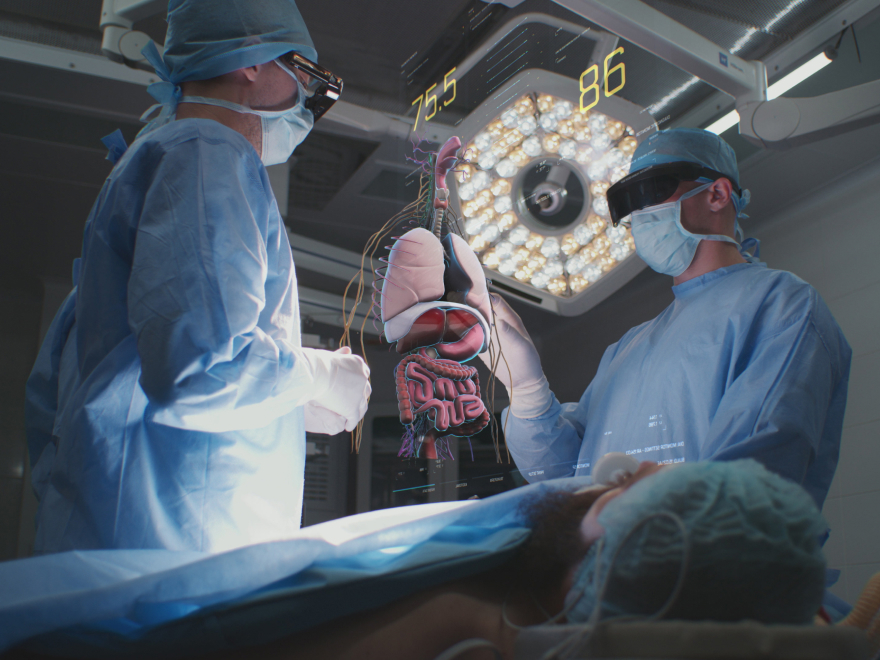
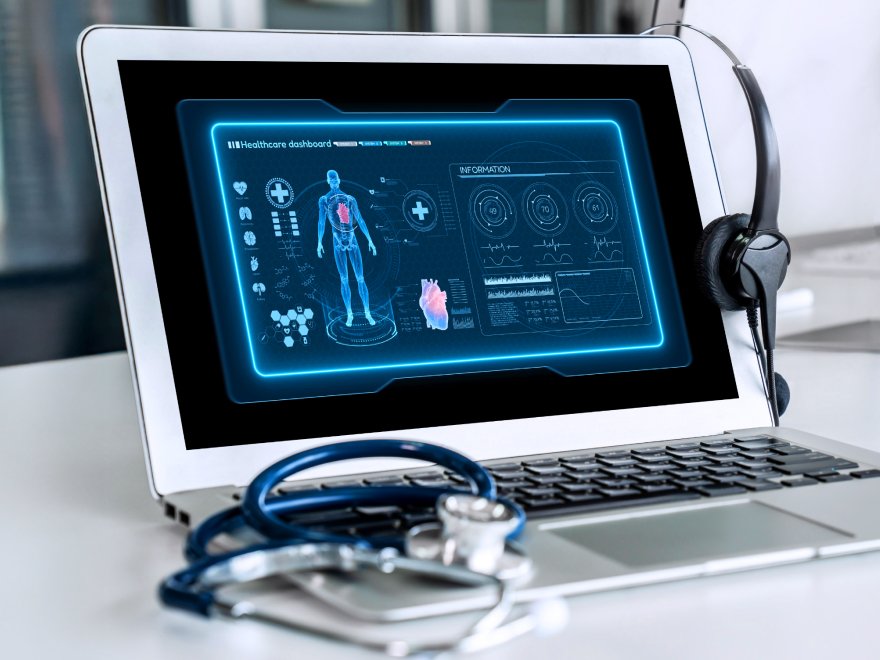


Uw bericht is verzonden.
We verwerken je aanvraag en nemen zo snel mogelijk contact met je op.

Door u aan te melden gaat u akkoord met onze Privacybeleidmet inbegrip van het gebruik van cookies en de overdracht van uw persoonlijke gegevens.